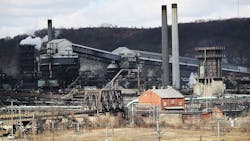On August 29, Nippon Steel Co. announced that it would spend an extra $1.3 billion on investments in two US Steel Co. plants once its attempt to purchase US Steel for $14 billion goes through. The latest plans almost double a previous announcement earlier this year to spend $1.4 billion on other improvements through 2026, increasing the total to $2.7 billion.
But despite the promises, Nippon Steel’s acquisition of US Steel remains contentious, with the United Steelworkers and several prominent U.S. politicians opposed to the purchase of the one-time U.S. metals giant by a foreign company.
In a statement, Nippon Steel Vice Chairman Takahiro Mori said the latest investments would allow Nippon Steel to continue operating the Pittsburgh, Pennsylvania, and Gary, Indiana, plants.
“We are excited to build upon the strong steelmaking legacy in the Mon Valley and Gary for the benefit of all stakeholders and the American steel industry for generations to come,” said Mori.
The latest promised investments would see $1 billion go towards increasing high-grade steel capacity at the Pittsburgh plant and the other $300 million towards extending the production life of one of the Gary plant’s blast furnaces. That’s in addition to $1.4 billion in “maintenance and other necessary capital investments” Nippon announced for US Steel properties in March.
The money is contingent, however, on the Japanese steel company actually acquiring US Steel. Despite reaching a deal with the U.S. company in late 2023, Nippon Steel’s $14 billion offer has fallen under political and regulatory scrutiny. The union representing US Steel’s workers and both major presidential candidates are against the deal.
The United Steelworkers favor the company’s purchase by Ohio-based rival Cleveland-Cliffs Inc. instead of Nippon Steel. In an August 28 statement, the union’s president, David McCall, noted that the promised funds from Nippon Steel are not binding.
“A press release is not a contract,” he said, and called for Nippon Steel to “answer to pressing concerns regarding our critical supply chains and national security.”
In January, former president and Republican candidate Donald Trump opposed the deal in remarks made after meeting with the head of the Teamsters labor union. Trump, who favored aggressive tariff policies during his time in office, said he would “block it instantaneously.”
And on Labor Day, his opponent, Vice President Kamala Harris, reiterated President Biden’s stance against the purchase. At a campaign stop in Pittsburgh, she said “US Steel should remain American owned and American operated.”
For its own part, Nippon Steel has cast its agreement to purchase U.S. Steel as a way of hindering the Japanese and U.S. steel industry’s largest rival, China.
In March, a day after President Joe Biden commented that US Steel should remain domestically owned, the Tokyo-based metals company said in a release that the planned acquisition would “strengthen American supply chains and economic defenses against China.”
“No other U.S. steel company on its own can meet this challenge while also meeting antitrust requirements,” the company added, additionally promising the United Steel Workers there would be “no layoffs or plant closures until September 2026 under some conditions.”
The industrial dominance of China is a concern for Nippon Steel even in its home country. On August 30, Vice Chairman Mori said Japan should adopt similar trade policies to the United States and Europe to restrict Chinese steel imports.
About the Author
Ryan Secard
Associate Editor
Ryan Secard joined Endeavor B2B in 2020 as a news editor for IndustryWeek. He currently contributes to IW, American Machinist, Foundry Management & Technology, and Plant Services on breaking manufacturing news, new products, plant openings and closures, and labor issues in manufacturing.
